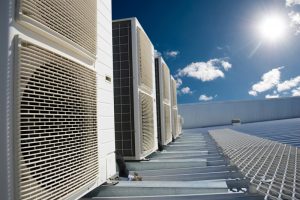 If you’re currently looking to install commercial or industrial HVAC equipment for your facility, you’ll immediately encounter the question of how powerful the equipment needs to be and how many units you’ll need to have installed to meet the climate requirements of the facility. In the HVAC industry, the job of determining the heating/cooling output requirements for new installations is called sizing. It doesn’t have a direct connection to the physical size of the units, but rather to their tonnage, a measure of their heating/cooling capacity.
If you’re currently looking to install commercial or industrial HVAC equipment for your facility, you’ll immediately encounter the question of how powerful the equipment needs to be and how many units you’ll need to have installed to meet the climate requirements of the facility. In the HVAC industry, the job of determining the heating/cooling output requirements for new installations is called sizing. It doesn’t have a direct connection to the physical size of the units, but rather to their tonnage, a measure of their heating/cooling capacity.
Understanding what tonnage is will help you grasp what goes into finding the right new HVAC installations—but you’ll absolutely need the assistance of our professionals for the job. Sizing commercial HVAC equipment is a complex task and it needs to be done accurately the first time. You can count on us for any commercial heating and commercial air conditioning installation in Toronto, ON and the Greater Toronto Area.

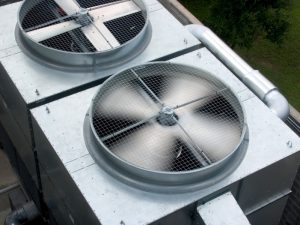 Commercial air conditioning systems consume a great amount of energy. Compared to the standard residential AC systems, a commercial system costs 150% to 200% more to run on average, and that doesn’t account for how much
Commercial air conditioning systems consume a great amount of energy. Compared to the standard residential AC systems, a commercial system costs 150% to 200% more to run on average, and that doesn’t account for how much 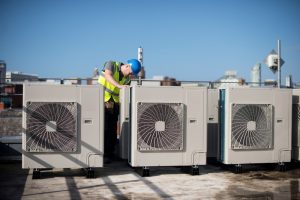 If you’re asking yourself the question in the title, then the answer is probably “no.” For some reason, you have doubts about your current air conditioning system and how well it’s serving your facility. You might wonder about temperature fluctuations, or concerns that the cooling costs are higher than they should be.
If you’re asking yourself the question in the title, then the answer is probably “no.” For some reason, you have doubts about your current air conditioning system and how well it’s serving your facility. You might wonder about temperature fluctuations, or concerns that the cooling costs are higher than they should be. This is a difficult question to answer in a standard blog because the type of business has a huge effect on control of temperatures and humidity. The range depends on whether the HVAC system is being used primarily to provide comfort to people inside the facility or if it’s designed to protect equipment and process. A large industrial space will need much different amounts of cooling during the summer than a small office space.
This is a difficult question to answer in a standard blog because the type of business has a huge effect on control of temperatures and humidity. The range depends on whether the HVAC system is being used primarily to provide comfort to people inside the facility or if it’s designed to protect equipment and process. A large industrial space will need much different amounts of cooling during the summer than a small office space.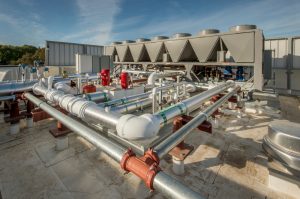 Providing air conditioning for a commercial or industrial facility is much different than air conditioning a residential home. Most houses use the same type of refrigerant-based split systems to provide cooling. There are some variations in design, such as ductless mini splits and packaged units, but they still operate on the exact same principles.
Providing air conditioning for a commercial or industrial facility is much different than air conditioning a residential home. Most houses use the same type of refrigerant-based split systems to provide cooling. There are some variations in design, such as ductless mini splits and packaged units, but they still operate on the exact same principles. 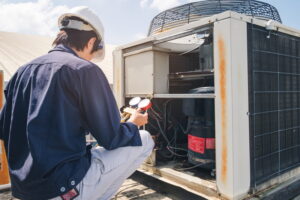
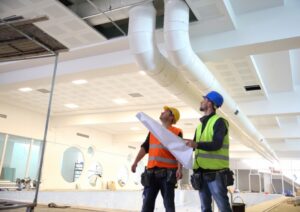 Commercial HVAC is a complex field that requires years of training and experience. Most business owners and commercial facility managers don’t have specialized knowledge of this field, and that’s the reason they rely on contractors like us for their commercial air conditioning and
Commercial HVAC is a complex field that requires years of training and experience. Most business owners and commercial facility managers don’t have specialized knowledge of this field, and that’s the reason they rely on contractors like us for their commercial air conditioning and 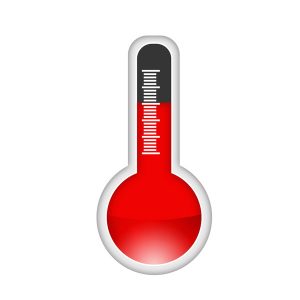 One of the most important commercial HVAC services we offer for our customers is cooling for a relatively small area of a facility. But it’s one of the most vital areas: the server room (also computer rooms and IT rooms).
One of the most important commercial HVAC services we offer for our customers is cooling for a relatively small area of a facility. But it’s one of the most vital areas: the server room (also computer rooms and IT rooms).  At no other time have people been more aware of the need for improvements to indoor air quality in both homes and businesses than now. We often work with
At no other time have people been more aware of the need for improvements to indoor air quality in both homes and businesses than now. We often work with 